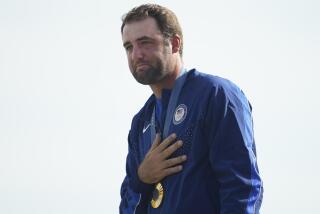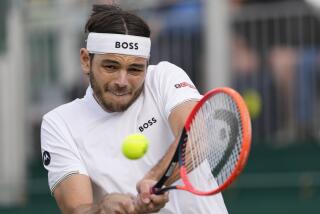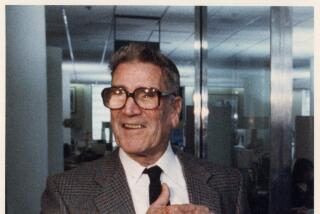Andy Murray finally gets tennis gold for Britain
- Share via
LONDON -- At midafternoon here Sunday, on the hallowed soil of Wimbledon, a native son bent to the ground in celebration and wonder, and an entire United Kingdom figuratively did the same.
Andy Murray, a Scottish entry to the British heritage, had not only won the Olympic gold medal, but had done so at Wimbledon, against the same man who had beaten him on the same court four weeks ago in the Wimbledon final.
The only thing that could be more beloved by these British fans than Roger Federer, their adopted and incredibly popular seven-time Swiss Wimbledon champion, was Murray beating him in their midst.
On this day, blood ran thicker than water, and medals were more important than strawberries and cream.
This was a day that will have them ordering one more pint in the pubs for years to come. Olympics on British soil are special enough, but having perhaps their most high-profile international athlete come through in the face of indescribable pressure and responsibility is worth a decade or two of late-night draws.
With a week to go, the faces of the British legacy of these Olympics are yet to be established. But Bradley Wiggins, Tour de France champion and cycling gold medalist, and Murray will be high on the list. And with tennis’ international profile, keeping Murray in the news week after week, his Olympic gold may end up the most revered.
It certainly will be that for British tennis fans, who had their most important moment since Fred Perry walked to the net at Wimbledon to shake the hand of beaten German opponent Gottfried von Cramm.
That was 76 years ago, and British fans have been teased through so many prospects and hopefuls ever since that their famed stiff-upper-lip resolve has been thoroughly tested. Before Murray, 25, emerged from Dunblane, Scotland, with a big serve and an ever-improving backcourt game, they emptied their lungs for Tim Henman. They even named a hill here for him, where they could watch a big-screen TV, have a picnic and give it their best full-throated dedication.
But Henman and his one-dimensional serve-and-volley game always left them stranded at the altar. So had Murray, until Sunday.
His victory was no fluke. He had not made the final after others were injured, nor did he have a fortunate draw. He beat world No. 2 Novak Djokovic of Serbia in the semifinals and was playing Federer, healthy and sharp as ever and back to No. 1. A month ago, Murray had won the first set of the Wimbledon final against Federer and then dropped the next three. In the awards ceremony, he told the crowd he was “getting closer,” then broke into tears.
The emotion was clear and an Olympic story line was set.
And, like Perry in his 6-1, 6-1, 6-0 stomping of Von Cramm, Murray made a definitive statement. Not only did he defeat the best player in the history of men’s tennis, 6-2, 6-1, 6-4, but he beat somebody who has lost on that same court three times since 2003. He also won nine straight games, four of them on Federer’s serve.
Federer himself said, “The result was a bit too brutal,” meaning he thought the score didn’t reflect the competitive nature of the match. In fact, it did.
The turning point was the third game of the second set.
Murray broke serve for 2-0. He was helped by Federer’s missing a floating duck at the net and Murray’s getting the benefit of a net cord that kept his passing shot from flying long. At that moment, a voice from the British crowd provided the best summary: “You’re golden, Andy.”
In the next game, Federer needed to make a last stand. He mixed shots, changed pace, stayed back and then approached the net. He got six break points and Murray saved them all. When Murray finally held serve, he clenched his fist to the crowd. He knew and so did they.
Federer, winner of a record 17 major titles, had played more than an hour and won only two games.
Somewhere up there, Fred Perry nodded.
“No way did I expect a scoreline like that,” Murray said.
Murray finished the match with aces of 130 and 133 mph. “The crowd helped me get a few extra miles an hour,” he said.
Federer admitted that “Andy was much better than I was today.…”
Murray called it, “The biggest win of my life,” and added, “I’ll never forget it.”
Nor will several million Brits.
More to Read
Go beyond the scoreboard
Get the latest on L.A.'s teams in the daily Sports Report newsletter.
You may occasionally receive promotional content from the Los Angeles Times.







